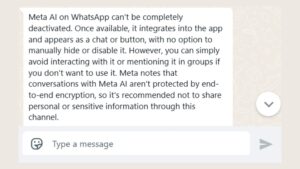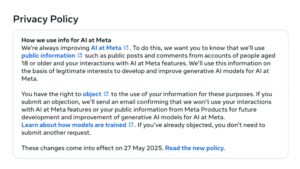Explained: What is Meta AI in WhatsApp?

WhatsApp users may have noticed a glowing circle in the bottom right corner of the app — this is Meta’s new AI chatbot, called Meta AI.
This recently introduced feature is part of Meta’s broader plan to roll out AI across its apps, including Facebook, Instagram, WhatsApp, and Messenger.
Meta AI is designed to assist users with tasks, answer questions, and create content. However, as its capabilities expand, so do concerns about misinformation, privacy, data use, and the responsible use of AI-generated content.
What is Meta AI in WhatsApp?
Meta AI is a virtual assistant within WhatsApp. While first introduced in WhatsApp, Meta plans to integrate it across its other platforms like Facebook, Instagram, and Messenger. Similar to digital assistants such as Apple’s Siri, Google Assistant, Amazon’s Alexa, and Samsung’s Bixby, Meta AI helps users by answering questions, generating content, and finding information.
How does it work?

Using Meta AI in WhatsApp is simple and intuitive. To start interacting with the chatbot, users tap on the icon that appears in the “Chats” section of the app. This will automatically launch a one-on-one conversation with Meta AI.
It is also possible to interact with the chatbot through the search bar at the top of the screen.

How do I use it?
The availability of this feature may vary by region. However, in general, you can use Meta AI in the following ways:
- Have one-on-one conversations: Users can ask questions and get helpful recommendations. It can provide information on a wide range of topics, including weather forecasts, sports results, current news, recipes, travel itineraries, and the opening hours of shops
- Chat with Meta AI in existing group conversations: Users can add Meta AI to an existing group chat, just like adding another participant. Once added, you can mention it using @MetaAI to ask questions. The assistant will respond within the group, helping with event planning, suggesting places, or answering questions that come up in the conversation.
- Create AI-generated images in chats: By typing “imagine” followed by your prompt in the message field, it can generate an image based on your description.
- Talk about interests: Users can also have casual conversations with Meta AI about hobbies, entertainment, or other topics you’re interested in.

Why don’t you have access to Meta AI – or some of its features – in WhatsApp?
If you can’t find Meta AI or certain features aren’t still available, there could be several reasons:
- Your app might need to be updated to the latest version of WhatsApp.
- Your device could not support the update, since some older devices may not be compatible with the latest features.
- There could be regional limitations: Meta AI was only recently introduced in Europe (March 2025), and some features are still being rolled out gradually. Availability may vary by country and even by user within the same country.

Privacy and Safety

When you start a new chat with Meta AI, you’ll see a brief message outlining privacy and safety information, with links to useful pages, like Whatsapp´s privacy policy and Meta AI´s terms. The message explains that the chatbot can only see messages that are directly shared with it, and that it does not have access to your private messages with other people.
However, it also advises users not to share sensitive or personal information, as the AI may retain and use this data to improve its responses.
Is it possible to deactivate?
Meta AI has been fully integrated into WhatsApp and, at the time of writing, there is no option to manually hide or disable it.

How to limit it
While you can’t opt out directly on WhatsApp, you can object to Meta using your public data for AI training on Facebook and Instagram:
– Facebook: Go to Settings & Privacy > Privacy Center > AI at Meta > Submit an objection request
– Instagram: Go to Settings and Activity > Privacy Center > AI at Meta > Submit an objection request
If you submit an objection, Meta will send you a confirmation email stating that your interactions with AI features or your public information from Meta products will not be used for the future development and improvement of generative AI models at Meta.
More information on this is available at the Meta Privacy centre.
What are the benefits?
For some users, this new feature can be useful for convenience and multitasking, as it offers an integrated way to interact with AI directly withing WhatsApp. It provides quick, convenient access to information such as weather updates, news, sports results, and local business details – all without leaving the app. It can also act as a personal assistant, helping with recommendations, planning, and creative ideas.
What are the limitations and risks?
Privacy Concerns
Meta AI was rolled out in the US in 2023, but its European launch was paused following intervention by the Irish Data Protection Commission over concerns about data privacy and compliance with EU regulations.

The technology has raised concerns about privacy, particularly around its use of user data to train AI models, “forced adoption”, and limited user control. Meta have outlined in their Privacy Policy that to train and develop their AI models they will use publicly available user information from its products such as Facebook and Instagram, for example account profile information and publicly visible comments and posts. While concerns have been raised that information on data usage should be more visible to users, additional information on the information that is used for AI, options for users, and the privacy policy is available on the Meta Privacy Centre.
Inaccurate, misleading or harmful content:
AI technology can contribute to inaccurate, misleading, or harmful content because it generates outputs based on patterns in the data it was trained on—which may include false, biased, or outdated information. Without fact-checking or human oversight, this can result in it producing content that seems credible but is incorrect or misleading.
Over reliance on AI:
As chatbots become more capable and accessible, users may start to depend on them for important decisions or information without verifying accuracy or considering alternative sources. This over-reliance can weaken critical thinking skills and increase the risk of accepting incorrect or biased information as fact. It is important for users to critically evaluate information from these services and understand that AI-generated responses shouldn’t replace professional help or trusted support channels, especially for complex or sensitive issues.
Advice for Parents

Get Informed:
As with any service or platform your child is using, it is important to become familiar with how it works and the potential risks to be aware of. Take time to explore Meta AI on WhatsApp yourself. Understanding how it works will help you decide if it’s suitable for your child’s age and needs, and allow you to guide them in using it responsibly.
Talk about privacy and safety:
Help your child understand the risks of sharing personal information online, including with AI-powered tools like Meta AI on WhatsApp. Encourage them to review their privacy settings, understand how their data is used, and to report anything they find uncomfortable or inappropriate.
Promote critical thinking:
Encourage your child to think carefully about the information they receive from Meta AI. Remind them that AI responses aren’t always accurate or reliable, and to fact-check information using trusted sources. Let them know they can always come to you or another trusted adult if they need support—or they can contact Childline’s listening service at 1800 66 66 66.
Encourage responsible use of chatbots such as Meta AI:
AI tools may be used by young people for help with schoolwork or creative tasks. Talk to your child about using these tools in a positive and ethical way. Remind them that AI can make mistakes and shouldn’t be their only source of information.
Keep the conversation going:
AI is evolving quickly, and it can be hard to keep up. The best way to support your child’s digital wellbeing is through open, ongoing conversations about their online life—the things they enjoy, the challenges they face, and how they feel. Our #TalkListenLearn online topic generator can help families start meaningful chats and stay connected
Useful links

#TalkListenLearn Online Topic Generator
Sometimes it can be hard to know how to start the chat with your child or teenager about what they are doing online, and the challenges and opportunities of the Internet. The Webwise #TalkListenLearn Online Topic Generator is a great way for families to have conversations about the online world in a fun, non-judgemental, way.
Talking to you child about online safety
It’s never too early to talk to your child about being safe online. Áine Lynch, National Parents Council Primary has practical advice and tips for parents of younger children.
Talking to your teen about online safety
What are the key things we need to teach teens about being safe online? Elaine Byrnes, Doctoral Researcher-Psychology, offers advice for parents on talking to your teen about online safety.
Parental controls are available on most Internet-enabled devices including computers, smartphones, tablets and gaming systems. Parental controls can help reduce the risk of your child encountering inappropriate content when they are online. Find out how to set up parental controls on all devices.
Webwise Webinar – In conversation with Mark Little: From misinformation to manipulation
With vast amounts of information online, it can be challenging to determine what is accurate and trustworthy. Mark Little, journalist and entrepreneur, recently discussed these challenges—along with regulation and online manipulation.
Parents – What is False Information
It is important to be able to judge how accurate and reliable our information is. This means asking questions about where our information comes from, who produced it and why, evaluating the impact it may have, and determining to what extent it can be trusted.
A Parents’ Guide to a Better Internet – Free Online Safety Booklet
The Webwise online safety booklet for parents is free, and provides advice and information on a wide range of key topics including privacy, safety, and developing critical thinking skills.
Stay informed by visiting the Webwise Parents Hub
The Parents Hub has free advice videos from experts in psychology, technology, education and parenting; Explainer Guides to popular apps and platforms; Talking Points; How-To Guides; and resources.
Information is everywhere and sometimes it can be difficult to judge how accurate or reliable information is. For more information, advice and tips, visit: bemediasmart.ie
Facts Matter is an introductory guide for adult literacy and adult education practitioners who wish to build their students’ knowledge, understanding, skills and confidence in critical thinking, media and digital literacy.





